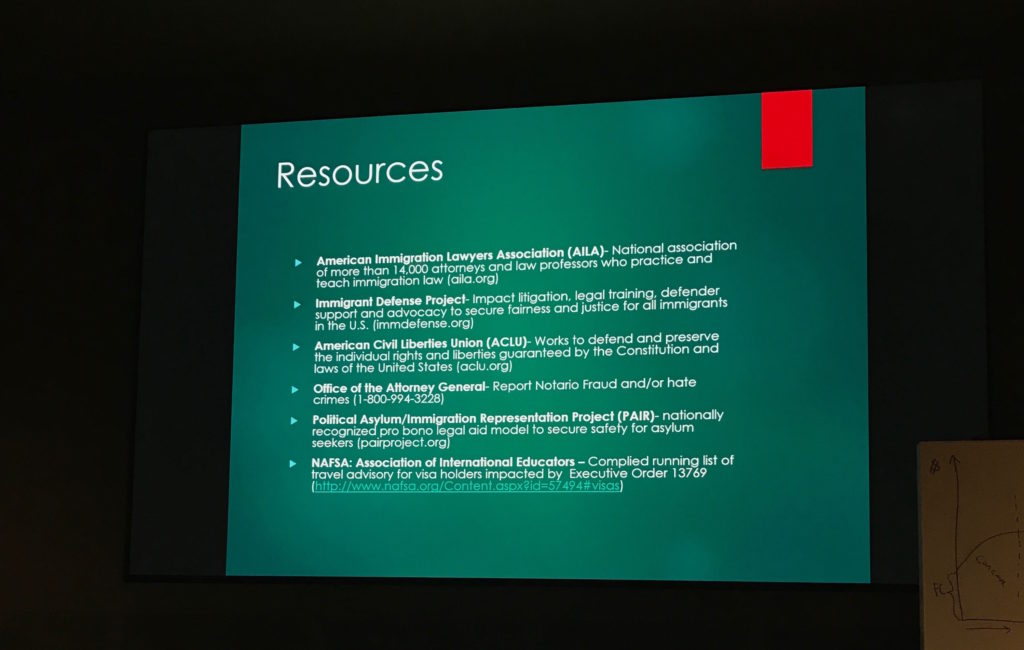Northeastern hosts travel ban info session
March 2, 2017
In the wake of confusion over how President Donald J. Trump will revamp his executive order restricting travel and immigration, Northeastern University’s administration has taken steps to inform students potentially affected by the ban and future orders Trump may issue related to immigration and deportation.
On Monday, immigration attorney Megan Kludt addressed the rights that immigrants and international students have in these situations in the Interdisciplinary Science and Engineering Complex. The Northeastern community also received an e-mail Monday with recommendations on international travel during spring break, which starts next week.
Kludt, a lawyer for Curran & Berger LLP Immigration Law in Northampton, Massachusetts, used her presentation to emphasize two main points. First, she said, the president does not decide who gets deported: That duty, lawmaking, lies in Congress and takes a significant amount of time to pass and put into practice. Second, immigrants have protections in place, such as guaranteed hearings.
“There are a lot of protections in place,” Kludt said. “You’re not going to get deported instantly, and that is not going to be changed easily.”
She said Trump is planning to reissue the order with minor technical differences so it cannot be challenged based on judges’ previous justifications behind the current halt of the ban and lawsuit against it. After Washington State filed a case against the ban, the courts put it on hold until the case made it to court because the ban was harming Washington public schools.
“I think he is starting to realize that he can get sued and he cannot do anything he wants,” Kludt said. “And he’s getting more advice on how to get around that. So this is going to be fascinating to watch. If we were not actually living it, it would be interesting.”
Northeastern was one of seven universities to sign onto an amicus brief in early February opposing the travel ban. The brief aligned Northeastern with an existing suit against the Trump administration that lists eight plaintiffs, two of whom are University of Massachusetts Dartmouth associate professors who were detained at Logan International Airport for three hours after the ban was implemented.
Muhammad Khalid, a freshman behavioral neuroscience major, said he went to the presentation to get more accurate information about Trump’s orders and their implications. He said the speaker’s profession as an immigration lawyer gave him confidence that he was receiving factual information.
“I was hearing a lot of the stuff on the news, so I just wanted to get updated on what was going on,” Khalid said. “There’s a lot of doubt about traveling over spring break and summer, so the speaker clarified that it shouldn’t be a big problem if you’re not from one of the seven countries.”
At the end of the talk, Kludt displayed a list of national resources for students to use if they need assistance.
Senior biochemistry major Melissa Paz attended Kludt’s talk because both of her parents immigrated to the United States from Mexico and are undocumented, so she wanted to find more resources and information for them.
“It helped calm me because I think I really panicked lately for them,” Paz said. “I think it went really well and was able to give me resources that I needed.”
During the talk, the Student Affairs team and the Northeastern University Police Department sent an e-mail to the Northeastern community that offered international travel recommendations.
The e-mail encouraged students who are non-U.S. passport holders to schedule meetings with an adviser in the Office of Global Services to make informed decisions based on individual travel destinations, purposes and immigration history. The e-mail also recommended that students with passports from the seven countries affected by the travel ban – Iran, Iraq, Libya, Somalia, Sudan, Syria and Yemen – to avoid international travel, despite the current halt on the ban.
The letter included tips for international travelers to keep them safe and prevent them from losing pertinent immigration documents.
Links to additional resources were dispersed throughout the e-mail.
Paz said she appreciated the school’s efforts to help guide students affected by immigration and deportation issues.
“I think the school has been really great about showing their support for people, not even that aren’t from here but who have family who aren’t from here,” Paz said. “And just like being really positive and helping to kind of calm everything.”
Photo by Paxtyn Merten






